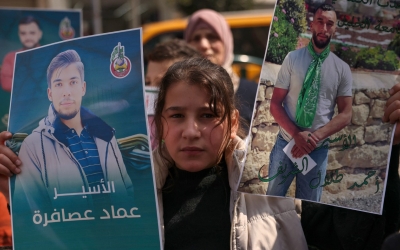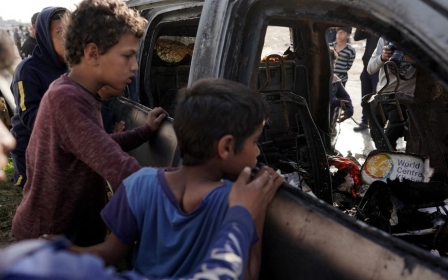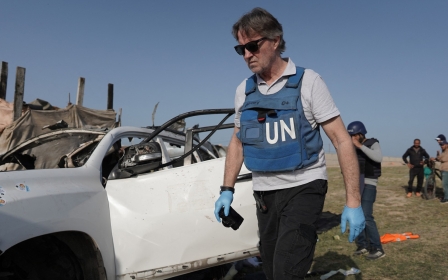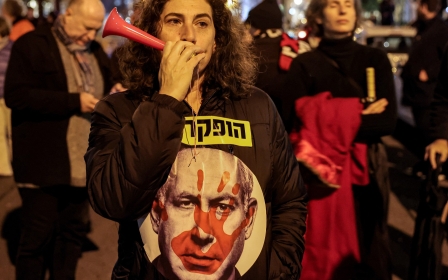Israel won't release journalist whose sick baby is solely reliant on breast milk

An Israeli court has refused to release a female Palestinian journalist whose prematurely born baby is solely reliant on her mother’s breast milk for nutrition, her family told Middle East Eye.
Rula Hassanein, 29, was detained on 19 March when several Israeli troops raided her home south of Bethlehem, in the occupied West Bank.
She was accused of incitement on social media, a charge that has frequently been filed against Palestinians since war broke out in Gaza on 7 October.
Stay informed with MEE's newsletters
Sign up to get the latest alerts, insights and analysis, starting with Turkey Unpacked
A military court based at the Ofer prison complex in the West Bank has postponed Hassanein’s trial session for the third time and rejected bail and release requests submitted by her lawyer. The trial is now set for Monday.
Last year, Hassanein gave birth to twins, Elia and Youssef, two months early due to health complications. Youssef died three hours later.
Elia was in an incubator for the first 40 days of her life. Now nine months old, she suffers from a weak immune system, which has led to ulcers on her palms, feet and mouth.
The latter makes it difficult for her to feed, leaving her solely reliant on her mother's breast milk.
"The child was screaming and crying in her room after she woke up to the soldiers’ voices,'' Shadi Brejiya, Hassanein’s husband, told MEE.
'My baby was crying and screaming in front of me without me being able to help her'
- Shadi Brejiya, husband
Brejiya said that upon raiding their home, Israeli troops handcuffed and blindfolded his wife, before dragging her into a military vehicle.
Hassanein asked to take Elia with her to prison, explaining the baby’s health issues to Israeli officers, but her request was denied.
Hours after the arrest, Elia began to dehydrate. She did not take any forms of feeding, and doctors were forced to provide nutrition intravenously.
“Our lives turned upside down in one moment. Everything became bleak, and my baby was crying and screaming in front of me without me being able to help her,” Brejiya said.
Israel rejected medication request
Hassanein has had her own health complications: she was diagnosed with a chronic kidney disorder in 2017.
Her sister told MEE that she suffers from minimal change disease, which requires her to see a doctor fortnightly and undergo regular tests.
"We were able to see her during her trial session a week after her arrest. She was very tired and her face showed exhaustion and lack of sleep and food,” Hadeel Hassanein said.
“I tried to wave my hand to her, but the guards prevented me and pushed me back."
After initially being taken to an army camp, Hassanein was transferred to the notorious Hasharon prison in the occupied West Bank, where Palestinian women are held.
Her sister said Israeli authorities rejected Hassanein’s request to take vital medication with her, and have held her in poor conditions.
There are no mattresses or blankets in the cell, and she is only being provided one under-cooked cold meal a day, Hadeel said.
Hassanein was later transferred to Damoun prison, with similar poor conditions and lack of food.
'Frightening' rise in women arrested
In recent months, Israel has rapidly increased its arrests of Palestinian women, including journalists, lawyers and activists - many of whom are mothers - under the broad charge of incitement.
According to the Palestinian Prisoners Society (PPS), the number of female prisoners reached 74 after the arrest of journalist Asmaa Harish and Khadra Hilal, the mother of a killed Palestinian, during a dawn raid in Ramallah on Wednesday.
Amani Sarahneh, the PPS spokeswoman, told MEE that the volume of arrests since the war on Gaza began has been “frightening”.
She said such numbers of detainees over a short period of time have not been recorded in decades.
The total number of Palestinian prisoners in Israeli prisons has reached 9,100, of whom nearly 8,000 were detained since 7 October.
“The charge of incitement is the most prominent that Palestinian detainees face, and when it is not proven against them, they are transferred to administrative detention, subject to renewal,” Sarahneh said.
Middle East Eye delivers independent and unrivalled coverage and analysis of the Middle East, North Africa and beyond. To learn more about republishing this content and the associated fees, please fill out this form. More about MEE can be found here.





